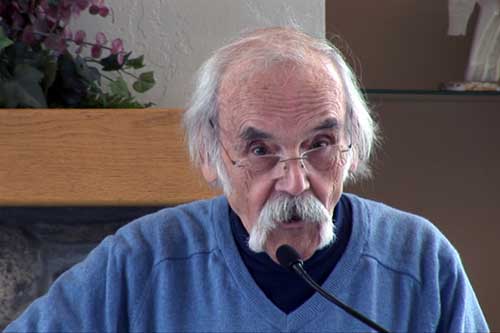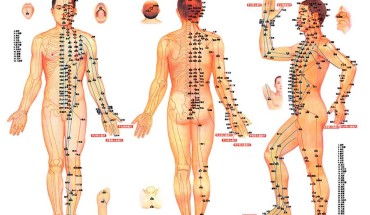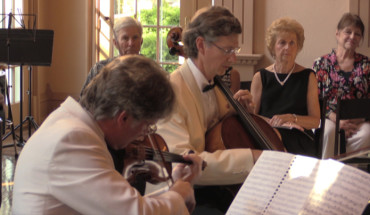Sunday, September 30, 2012, Norb Blei was the last of four individuals to address the Unitarian Universalist Fellowship of Door County in Ephraim, Wisconsin on “The Courage to Create.”
The event was comprised of four speakers presenting their thoughts on the creative process as personally experienced by a writer, an artist, a musician and a theologian. They respectively included: Norbert Blei, Chick Peterson, Katie Dahl and Phil Sweet. In essence, Norb Blei presented a recounting of the story of his life. Little did I know, this would be the last time I would ever hear him speak. Norbert Blei (August 23, 1935 – April 23, 2013) wrote 17 books of non-fiction, fiction, poetry and essays. In 1994, he established Cross+Roads Press, dedicated to the publication of first chapbooks by poets, short story writers, novelists and artists. The following is a transcript of the video recording included below:
I guess I’m in a clean-up spot here. Huh? I know some of you are asleep. Stay that way please! I don’t want to try to bother you.
Phil would probably understand, I have a bit of a problem with today’s theme. So, please excuse me for my occasional contrariness, not to mention, off-subject departures at times, trying to wend my way from what we’re supposed to be talking about and all the stuff floating around in this scattered old mind of mine.
Throw an old dog like me a bone called courage, or creativity, or both… and I’ll gnaw it to nothingness in a matter of hours or days. They didn’t used to call me the county curmudgeon or worse for nothing, you know.
I can already hear Phil murmuring to himself, ‘Oh no! But what else could I expect inviting this guy to my party?’
Then, excuse me please if I uh… take Rollo May the author of the “Courage to Create,” somewhat to task and as you see, I have my old dollar-ninety-five cent paperback from nineteen seventy-five which I discovered in my book shelf just days ago, entire passages underlined heavily in black, felt-tipped pen.
I realize too that I never did finish the book but I… (laughter) I can always tell when the last part is free of pen.
I’ll uh just underline passages in heavy black-tipped pen. I’m sure… I swallowed whole every word as a young writer trying to justify his own life unaware of all the years ahead that it would take to actually become a writer, living those years now some fifty years later, still expecting every morning, with little courage, to be born again the instant that I pick up the pen or the pencil or begin to click the keyboard with the hope of magic appearing on the screen keeping in mind as ever, Hemingway’s sound advice, quote “that every writer needs a built-in shit detector to face the world,” reminded as well of Rilke’s sacred words almost carved into the desk where I am staring out the window:
“The purpose of life” said Rilke, “is to be defeated by a greater and greater things.”
Courage? Did you say courage? You want courage? Don’t look to this sorry creative soul. Look instead into the heart of a thirteen-year-old boy, Bo Johnson, who stared death in the eyes every day and was more concerned about making it easier for others knowing that his own time was passing without ever experiencing all the wonder of all the years most of us are granted. Now, that’s courage.
Let me suggest that it doesn’t take courage to create as as much as it does take stupidity, with more than a dash of curiosity, perseverance and what at times becomes mindless compulsion, a certain helplessness, something you can’t do a thing about but eventually accept it for what it is. This is what you do, all you can do. This is who you are and why you were put here. In my case,to write.
So there deal with that. Do what you can with it. See where it takes you. Success, isn’t even a factor. Remember, the purpose of life is to be defeated by a greater and greater things. Begin with whatever words given you at the moment and make them say what you want them to say or need them to say and just try to get better at the job every day.
At this point, I come to you by way of notes, notes and more notes, the writer’s way, nothing, everything ever quite finished to satisfaction the way most unprepared, perplexed writers find themselves caught in the midst of a subject greater than they can handle given the rush of time and for me overwrought, overburdened, overworked, overextended, lost in a floating mindscape waiting for the restoration of one’s senses, one’s self, one’s energy after a serious bout of bad health two years ago but still trying to put those words together.
So, I note. I scribble. I say to myself, to whoever is listening, or reading, that there is a double life to be content with; the life others expect you to live – friends, family, spouses, neighbors – and the life you have little control living, doing what you want and must do to create if you will. Not always easy, always open to conflict and criticism, being true to yourself.
Do I detect an element of courage there? Well, possibly.
Note: Creativity and chaos how they go hand in hand.
Every day the serious writer tries to establish some kind of order out of chaos. Does that take courage? I’m not sure. I know that the challenge of making something out of nothing but words, words, words and shaping that chaos day after day ’til… Well, there! Everything finds some kind of place. Fini, the end. Not too bad.
Note: One’s personal history in finding his way to the freedom to write and this would take hours, years to deal with. It would take a novel, a memoir, something huge, the message being, without freedom you cannot create. And it takes a little courage to break whatever bonds that keep you from who you are and what you must do.
But back to the stupidity factor I mentioned in the beginning. Stupidity, was leaving a secure job teaching Honors English on a high school level and later literature in a junior college, a contract, a comfortable enough salary, a great pension plan, respect in the family, the neighborhood, among the friends, students who loved what your ability to encourage, to teach on your own terms and was all about? But no! You wanted to write.
So, you threw all that overboard after less than ten years, without the safe money stashed away in your pension fund, traveled throughout Europe for months and months living in Paris awhile, was a rite of passage for every real writer you had ever read. Throwing all that away, come home. No real job. Nothing in mind but the stupid and growing desire to live a writer’s life.
Now, few people would call that courage. That’s not what my parents called it, not what my in-laws called it, and my mostly blue-collared boyhood friends with a future, all on the way to a house and family in the suburbs 0 earning good bucks for what they did with their hands, banking on retirement and social security.
Did it take courage for me to finally get a job delivering mail door-to-door for the US Postal Service? and occasionally filling in as a substitute teacher? …while all the while wanting to write? The explanation of the joke was, whenever some someone asked my in-laws, or my wife, “What’s …he doing?” And their pert reply was, “Oh, he’s thinking.” or “Oh, he’s trying to find himself.” …as I slowly did, beginning to publish my first short stories for little-known, little read, underground literary magazines of little payment but copies, and then beginning to publish major features in all the major magazines and newspapers from Chicago that paid real money.
But was the writer in me satisfied? No. Of course not. Did it take courage to leave all this behind and… I do mean all, especially work …courage to pull up stakes, leave all that behind for the peace and quiet of the backwoods of Door County because everything, the city especially was getting too loud? I couldn’t concentrate on the serious stuff. Everybody wanted to be a writer but nobody was writing.
For ten years, I survived as what was known in the trade as a freelancer. In other words, a gun for hire, living on the road back-and-forth, Door County to Chicago, going down there to look up the stories, take the notes bring ’em back, write the story and wait for the check. Back-and-forth writing to put food on the table and… writing serious short stories, and essays, and novels, attempting to get at both the art and the matter, which is pretty much where I find myself to this very day, though I have chucked the freelancing for the most part and devote most of my time to honing the art of writing.
Note: Well there’s so much more…
But you people have been sitting here long enough already and I don’t have the time or space and I have no doubt that I have already worried the subject to death and wore out my welcome and I didn’t even get to the serious hazards of …this trade, of any artistic persuasion. By that I mean alcoholism. Because, when you get right down to it, what’s it really all about, Alfie? Nothing.
I have a lost less-than-courageous friends through everything that I have described thus far, writer friends, painter friends, photographer friends, all going down in one way or another.
You want depression? Here’s Joseph Conrad’s wife describing her experience living with one of the world’s great writers:
“The novel is finished but the penalty has to be paid. Months of nervous strain have ended in a complete nervous breakdown. 30 Poor Conrad is very ill and Doctor Hackney says it will be a long time before he is fit for anything 0 requiring mental exertion. I know both you and dear Mrs. Melgram will feel every sympathy with him. There is the manuscript, complete but uncorrected and his fierce refusal to let even I touch it. It lays on a table at the foot of his bed and he lives mixed up in the scenes and he holds and converses with the characters. I have been up with him night and day since Sunday week and he who wish usually so depressed by illness, maintains he is not ill and accuses the doctor and I of trying to put him away into an asylum.”
Here’s another thing in Conrad’s life that often leads to depression, a life that often drives many serious writers a little crazy writing stuff you don’t want to write, but have to write, to survive, writing pot-boilers. I wasn’t aware that this was true even of… uh… Conrad’s life ’til I picked up this biography of him recently. Conrad led with exhausting vitality from his actual roles as husband and father.
There’s a famous anecdote Illustrating a quite literal and domestic instance of that quality of appearing aloof and apart which Virginia Wolf noted in his genius. He would allow Jesse and the boys to travel with him in a train compartment but only if they pretended not to be with him and was once most annoyed when the evidently sorely tired Jesse needed him to help with the luggage.
One biographer has compared Conrad’s literary career and his financially insecure but artistically flourishing period to that of the hero of Henry James’ short story “The Next Time.” Pressurized by his family commitments, the writer then tries even harder to write in the popular manner he feels will provide a money-spinning bestseller only to find that every “next time,” he produces a work more brilliant and unsaleable than the last.
Final note: Where is the joy?
Well, you’re gonna have to ask me back another time to talk about that. But, let me leave you with this, that uh… It’s all joy. That uh… every stupid and courageous minute of it is really pure joy. I have lived an impoverished life, richer than anyone could ever imagine, and to hear just one person say, “You know, what you wrote, changed my life.” end of quote… is the only social security payment that matters.
Thank you.
Production Credits: DesignWise Studios, Sturgeon Bay, WI Video-journalist: Stephen Kastner Music: Alastair Cameron Sound Recording Engineer: Sheila Saperstein, Unitarian Universalist Fellowship






